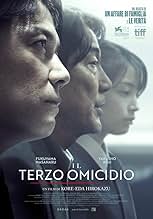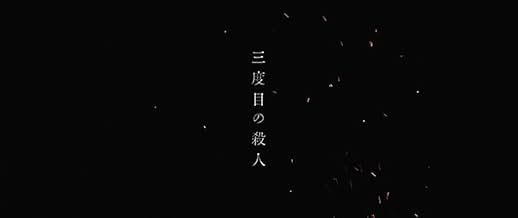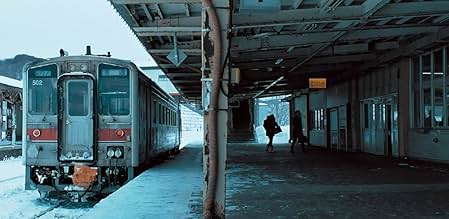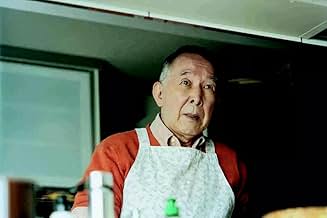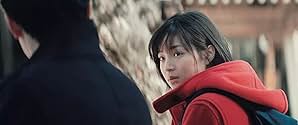CALIFICACIÓN DE IMDb
6.7/10
8.6 k
TU CALIFICACIÓN
Un drama judicial centrado en el asesinato del presidente de una fábrica.Un drama judicial centrado en el asesinato del presidente de una fábrica.Un drama judicial centrado en el asesinato del presidente de una fábrica.
- Premios
- 6 premios ganados y 17 nominaciones en total
- Dirección
- Guionista
- Todo el elenco y el equipo
- Producción, taquilla y más en IMDbPro
Opiniones destacadas
The murderer in this film has killed twice. So, why is the film called 'The Third Murder?' It's up to the viewer to answer the question. In my view, the third victim is the truth. As one of the protagonists remarks in a crucial scene: 'No one has spoken the truth'.
'The Third Murder' is a film asking a lot of questions, but answering few. To be clear: that's a good thing. What is truth? What is righteousness? Which of the two are more important for a lawyer? And for a judge? Is capital punishment always wrong? Or, in the words of the killer: should some people never have been born?
With this film, acclaimed film maker Hirukazo Kore-eda takes a different path from many of his previous films. He is known for his delicate and subtle dramas about the family life of ordinary people. This time, he has made a sort of courtroom drama (although only a small part is actually set in a courtroom) about a killer and his possible motives.
Still, the theme of family relations is not absent in this film. Far from it, in fact. Fatherhood is omnipresent. One of the most important characteristics of the killer is how he has failed as a father. The lawyer defending him discusses the case with his own father, a retired judge who has convicted the same killer decades earlier. And the dead victim turns out to have been the worst father imaginable. At least, in one version of the truth.
'The Third Murder' is a multi-layered, complex film which offers lots of surprises and twists. Kore-eda succeeds in keeping the viewer wondering what comes next. But at the same time, the result is less convincing than in some of Kore-eda's best family dramas, in which human nature is dissected by small acts and symbolic details. Not by important, philosophical questions.
'The Third Murder' is a film asking a lot of questions, but answering few. To be clear: that's a good thing. What is truth? What is righteousness? Which of the two are more important for a lawyer? And for a judge? Is capital punishment always wrong? Or, in the words of the killer: should some people never have been born?
With this film, acclaimed film maker Hirukazo Kore-eda takes a different path from many of his previous films. He is known for his delicate and subtle dramas about the family life of ordinary people. This time, he has made a sort of courtroom drama (although only a small part is actually set in a courtroom) about a killer and his possible motives.
Still, the theme of family relations is not absent in this film. Far from it, in fact. Fatherhood is omnipresent. One of the most important characteristics of the killer is how he has failed as a father. The lawyer defending him discusses the case with his own father, a retired judge who has convicted the same killer decades earlier. And the dead victim turns out to have been the worst father imaginable. At least, in one version of the truth.
'The Third Murder' is a multi-layered, complex film which offers lots of surprises and twists. Kore-eda succeeds in keeping the viewer wondering what comes next. But at the same time, the result is less convincing than in some of Kore-eda's best family dramas, in which human nature is dissected by small acts and symbolic details. Not by important, philosophical questions.
In recent years, Hirokazu Koreeda has been among the most exciting and interesting Japanese filmmakers. In movies such as "Like Father, Like Son", "Our Little Sister" and "Shoplifters", he tells marvelous stories about seemingly ordinary and non-cimematic sitations....stories about real people and about problems which you rarely hear about in Japanese movies. Here, in a bit of a change of pace, Koreeda takes on a story about murder....and it's complex, strange and ultimately worth seeing. Sadly, however, the pacing is glacially slow...and many viewers ultimately might give up on the film before its conclusion.
The story is about a group of lawyers who have been a pretty hopeless case to defend. It seems a man has pled guilty to murder and burning a corpse...and he's done little to help himself avoid the death penalty. In addition, his story is very inconsistent and keeps changing. Inexplicably, instead of just going through the motions as most lawyers would do in a case like this, Shigemori keeps digging to learn exactly what did happen and why...and, not surprisingly, it's not what the case originally seemed to be.
The story is slow....very, very slow. For non-Japanese audiences, this slowness makes watching the film with subtitles a bit tough...and I found myself drifting off on occasion. My advice is to stick with it....the twist is shocking and exposes some issues rarely addressed in films...especially Japanese films. Not surprising, as Koreeda seems to enjoy addressing topics which other Japanese filmmakers avoid.
The story is about a group of lawyers who have been a pretty hopeless case to defend. It seems a man has pled guilty to murder and burning a corpse...and he's done little to help himself avoid the death penalty. In addition, his story is very inconsistent and keeps changing. Inexplicably, instead of just going through the motions as most lawyers would do in a case like this, Shigemori keeps digging to learn exactly what did happen and why...and, not surprisingly, it's not what the case originally seemed to be.
The story is slow....very, very slow. For non-Japanese audiences, this slowness makes watching the film with subtitles a bit tough...and I found myself drifting off on occasion. My advice is to stick with it....the twist is shocking and exposes some issues rarely addressed in films...especially Japanese films. Not surprising, as Koreeda seems to enjoy addressing topics which other Japanese filmmakers avoid.
With "The Third Murder" Hirokazu Koreeda sidepaths from the more lighthearted thematics his more recent movies like "our little sister" or "after the storm" had and reenters the realm of profound dramas in which he previously worked with in movies like "Like father like son" and one of his ealier works "after life". While the light hearted stuff is enjoyable and it is not as much of a risky "hit and miss" as a movie like "afterlife" might be, I think his more deep and serious movies are definitly more impacting and memorable, thats why I think "The third murder" is definitly one of Koreedas finest works.
In this crime thriller Koreeda explores heavily the ideas of truth, justice and especially motivation. Why do people say what they say? Can we really trust anyone? This movie was just so beautifully crafted with nearlly every scene you learn new things about character you thought you know already, just to find out how wrong you were, until you dont know what to believe anymore.
The cinematography was pretty unique to his other movies I would say. He added some emotionally driven music shots that fitted quite well with the tone of the movie and made some character interactions that were already tense and interesting even better by presenting interesting camera shots.
It was only fitting for Koreeda to give Masaharu Fukuyama the lead role given how well he did in "Like father like son" and he did a wonderful job again with this role. Also one of japans best actors "Koji Yakusho" did a perfect job, like most of the time and gave his role the exact nuance i was talking about previously, with being able to make yourself question your own judgement.
Overall I can only recommend this movie. Hirokazu Koreeda is one of Japans best living directos and "the third murder" is one of his best movies and I am already looking forward of rewatching this movie.
In this crime thriller Koreeda explores heavily the ideas of truth, justice and especially motivation. Why do people say what they say? Can we really trust anyone? This movie was just so beautifully crafted with nearlly every scene you learn new things about character you thought you know already, just to find out how wrong you were, until you dont know what to believe anymore.
The cinematography was pretty unique to his other movies I would say. He added some emotionally driven music shots that fitted quite well with the tone of the movie and made some character interactions that were already tense and interesting even better by presenting interesting camera shots.
It was only fitting for Koreeda to give Masaharu Fukuyama the lead role given how well he did in "Like father like son" and he did a wonderful job again with this role. Also one of japans best actors "Koji Yakusho" did a perfect job, like most of the time and gave his role the exact nuance i was talking about previously, with being able to make yourself question your own judgement.
Overall I can only recommend this movie. Hirokazu Koreeda is one of Japans best living directos and "the third murder" is one of his best movies and I am already looking forward of rewatching this movie.
Included in the extras on the Arrow disc of this film is a very thoughtful piece by Tony Rayns. He was careful to avoid as many spoilers as possible and as it turns out I would have done well to listen to him before watching the film. The Japanese judicial system, it turns out, is very different from everybody else's and the 'trial', it would seem is no such thing. Even with the recently reintroduced jury (who seem to play little part) the defendant is pretty much assumed guilty and the whole procedure an opportunity for society, in the form of the judge, to smooth things over and be as precise as possible as to sentence. All this would have helped when watching this rather long and complicated tale. Most of the 'complications' however occur in the matter surrounding admission of guilt and the fact that here, the truth and actual guilt are a moving feast (complete with seeming unreal flat-backs) makes for a difficult ride for the uninitiated. Powerful, nevertheless, with fine central performances and whilst I felt watching the film, that one viewing would be enough, learning more has led me to suppose another viewing might be more enjoyable.
It's interesting that Koreeda approaches an apparent thriller in the same way he approaches his family dramas. In fact, this is a drama and, as usual for him, a film about people and grey areas. Here, he addresses the difference between legal justice and what may be ethically acceptable even if a crime.
It's not an easy film, with a quite slow pace and few events that capture our interest. Despite loving thrillers and loving Koreeda's usual style, this film left me wanting much more. Nevertheless, the approach is interesting, the performances are very good, it's beautifully shot (with incredible mirror shots), and the ethical issues it raises stay with us.
It's not an easy film, with a quite slow pace and few events that capture our interest. Despite loving thrillers and loving Koreeda's usual style, this film left me wanting much more. Nevertheless, the approach is interesting, the performances are very good, it's beautifully shot (with incredible mirror shots), and the ethical issues it raises stay with us.
¿Sabías que…?
- TriviaThis is the first fiction film from Hirokazu Koreeda that was shot in anamorphic digital and framed in 2.35:1.
Selecciones populares
Inicia sesión para calificar y agrega a la lista de videos para obtener recomendaciones personalizadas
- How long is The Third Murder?Con tecnología de Alexa
Detalles
- Fecha de lanzamiento
- País de origen
- Sitios oficiales
- Idioma
- También se conoce como
- The Third Murder
- Locaciones de filmación
- Rumoi Station, Rumoi, Hokkaido, Japón(the three lawyers arrive in Rumoi)
- Productoras
- Ver más créditos de la compañía en IMDbPro
Taquilla
- Total en EE. UU. y Canadá
- USD 89,315
- Fin de semana de estreno en EE. UU. y Canadá
- USD 10,670
- 22 jul 2018
- Total a nivel mundial
- USD 13,411,936
- Tiempo de ejecución
- 2h 4min(124 min)
- Color
- Mezcla de sonido
- Relación de aspecto
- 2.35 : 1
Contribuir a esta página
Sugiere una edición o agrega el contenido que falta


